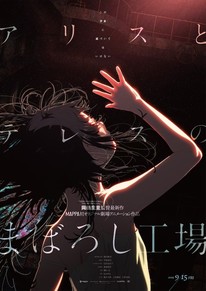Review
by Richard Eisenbeis,Alice to Therese no Maboroshi Kōjō Anime Film Review
| Synopsis: |  |
||
Young Masamune's life is a normal one. He goes to school, hangs out with friends, and practices drawing in his rural Japanese town. But then everything changes for the surreal. When an explosion at the local steelworks factory literally shatters the sky, the town is cut off from the rest of Japan, the seasons cease to change, and people stop aging. Everyone tries to continue on as normal—hoping that if they hold on long enough, the world will right itself. Yet, as the days pass, nothing changes—until the day Masamune's classmate Mutsumi sneaks him into the factory to help her take care of the mysterious feral girl living there. |
|||
| Review: | |||
Alice to Therese no Maboroshi Kōjō is the newest thought experiment from the mind of acclaimed writer Mari Okada (anohana: The Flower We Saw That Day, Mobile Suit Gundam: Iron Blooded Orphans)—this time centered around living in the hell that would be to exist in a truly static world. Nothing can grow or change—something especially hard on the humans trying to live through it. On the surface, it's bad enough with a total lack of novelty—no changing of the seasons and no new forms of entertainment. But deeper down, the whole situation is massively more depressing. Masamune is expected to be 14 forever—to go to school and study every day. He will never grow up, get a job, or leave the small town. But he's far from the only one suffering. Imagine being an old person, struggling with daily tasks and unable to even die. Or consider what it would be like to be the parents of an infant who will never leave the terrible twos or a pregnant woman who will never see her child born. This is the despair facing the people of the town. And their only hope is to keep on as usual, hoping the world will someday fix itself. Yet, those in this situation face something even more terrifying: the fear of change. While their lives are objectively hellish, they are also tolerable due to their familiarity. But what happens when people start to overcome their fear of the unknown and bring changes to their static lives? What happens to those who gain things they had only dreamed of and those whose last hopes are soundly crushed? These are just some of the ideas explored throughout this film. This film is also clearly inspired by Alice in Wonderland—though as told through the eyes of those in “Wonderland” rather than Alice. The wild girl, Itsumi, clearly doesn't belong in their world, and her very existence seems connected to the ongoing strange events in their town. At the same time, the film draws from The Ones Who Walk Away from Omelas—questioning the morality of preserving the lives and happiness of the many through the horrible mistreatment of a single child. Beyond this, there are explorations about the mindsets that give rise to cults and the human tendency to listen to the person who seems like they have answers in a crisis—even if these explanations would usually seem crazy and genuinely have no basis in fact or logic. Yet, when it comes down to it, the film is about the difference between making the best of a situation versus simply resigning yourself to it. While the former gives rise to hope, the latter only causes a slow decline into despair. The film's moral is simple: Live for every moment, especially if the end is near, and never be afraid to fight for what you truly need to make life worth living. On the visual side, Alice to Therese no Maboroshi Kōjō is simply amazing. There is an excellent amount of care put into creating the early '90s town of the film—from the interiors of homes and rooms to the rusting beams of the steelworks factory. The amount of detail is simply astounding. But all that pales in comparison to the surreal scenes we get later in the film as the world begins to shatter and what is on the other side begins to shine through. It is something special that needs to be experienced firsthand—and preferably on the big screen. As for the music, the non-diegetic score does its job well, conveying the emotion and action present in each scene. But what really stands out are the pieces of diegetic '90s music heard occasionally throughout—that place the story in the early '90s as much as anything we see in the film. Alice to Therese no Maboroshi Kōjō uses a surreal thought experiment to dive deeply into human nature. It's got a solid cast of characters of all ages with relatable problems and struggles—some of which they can overcome and others they cannot. And if that weren't enough, it's visually stunning—to the point that it's worth a watch on that level alone. Is it the absolute best anime that Mari Okada has ever written? No. But it's certainly in the top 10. |
| Grade: | |||
|
Overall : A-
Story : A-
Animation : A
Art : A
Music : B-
+ A visually stunning thought experiment about the hell of living in a truly static world. |
|||
| discuss this in the forum (12 posts) | | |||
| Production Info: | ||
|
Full encyclopedia details about |
||